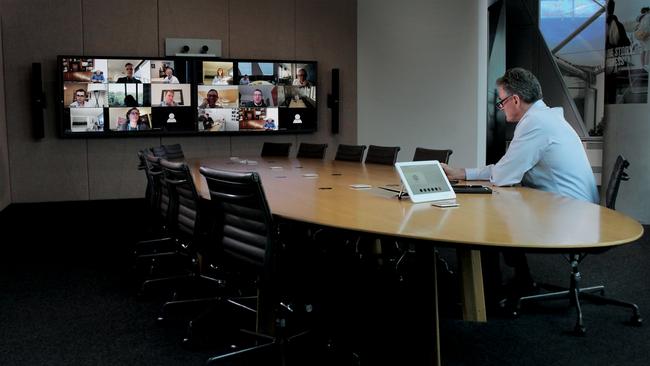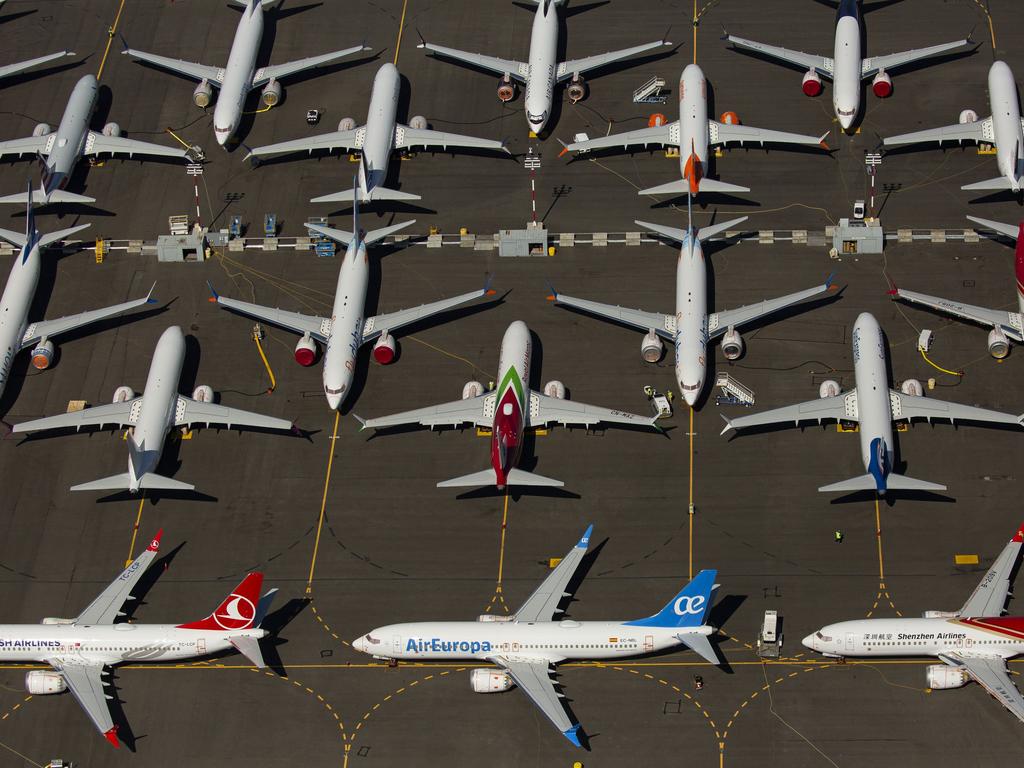It’s lonely at the top for NAB boss Ross McEwan as nation locks down
NAB boss Ross McEwan is running a huge corporation from an empty room, connected through videoconferencing.

When the Harvard Business Review polled chief executives and found half of them had feelings of loneliness, it had more to do with having no one to confide in than actual physical isolation.
Two years later, amid the coronavirus pandemic, National Australia Bank boss Ross McEwan and his peers are running huge corporations from an empty room, connected through videoconferencing to executive teams working at home.
The transition was endlessly workshopped for a decade or more without meaningful progress, but in March 2020 it arrived in a mad rush. “At NAB, because we’ve had to, we’ve got almost 30,000 of our 34,000 colleagues working from home or remotely,” McEwan tells The Weekend Australian.
“About 75 per cent of our colleagues in contact centres are working at home because very quickly we’ve been able to give them the technology and capability to do so.
“These are very big, 10-year transitions that are being tested and delivered very quickly, basically overnight, because of coronavirus, and that’s not just for a bank.”
McEwan is deeply interested in what this all means, and for a leader who relishes the people side of the business he’s also a little bit concerned.
For example, what does the future hold for big corporate head offices dotting CBD skylines?
“Will people miss the social interaction that happens at work and what are the issues that may result because of that?” he asks.
“I get a lot of energy from being around colleagues serving customers, and that social interaction and engagement is something I’m missing at the moment, as I’m sure many people are.”
McEwan’s disrupted work routine was changed again on March 17 after a coronavirus scare at 700 Bourke Street in Melbourne, where his office is located.
The building was immediately evacuated for a “pandemic cleaning”.
Soon after, with McEwan ensconced in a city hotel as well as working from home, the worker was reportedly sacked for falsifying a positive result.
It was just another day at “the office”.
While the broader economy is shuddering to a halt, banks have been busier than ever. This week McEwan said 200,000 customers had been in touch about hardship packages in just over a week. Other banks including ANZ and Commonwealth Bank have seen a similar volume of inquiries.
At the same time the nation’s big banks have been working around the clock with the federal government and regulators to develop support packages for customers caught out by the coronavirus fallout.
Working at home, of course, is the visible manifestation of a deeper, underlying trend — the accelerating switch to digital forms of banking and communication more broadly.
Before the pandemic, all the major banks were responding with varying degrees of success to a digital tsunami, with McEwan’s predecessor Andrew Thorburn unveiling a $1.5bn, three-year transformation plan in 2017.
McEwan has continued to execute the blueprint, which emphasises slick digital channels to improve the customer experience by delivering fewer and simpler products.
The number of products is expected to collapse by half from 600 to about 300, and more than 65 per cent of simple consumer products will be sold through digital platforms, up from 31 per cent in 2017.
Again, the NAB chief poses the question: “If customers can’t come into a branch for three weeks or three months but they’re still able to do everything they need to on the NAB app, through a contact centre, over video-conferencing or our website, what does that mean for the future?”
“There may be a number of customers who don’t regularly come back to a branch unless they really need it for service because they’ve found they can do it all through other means.
“Even elderly customers who we thought may not want to bank digitally are having to, and they’re picking it up very quickly.
“A couple of our bankers spent an hour on the phone this week with a 90-year-old customer stepping through what she needed to do to carry out her banking on mobile banking, and she picked it up straight away.”
McEwan says there will always be a future for branches and business centres, but the coronavirus experience could mean there will be fewer and what they did would inevitably change.
“In my view, branches and business centres will become much less about somewhere to go for a basic transaction, and more a hub for service and advice when you need it,” he says. “We’re also seeing less traffic on roads as fewer people come into the office, and flights have been cancelled.
“How much of that will pick back up to what we considered normal? If I can connect well over video conference and get everything done, do I want to drive into work five days a week or get on a plane twice a week to do meetings in person?
“There is going to be a whole range of new normals created on the other side of this crisis.”






To join the conversation, please log in. Don't have an account? Register
Join the conversation, you are commenting as Logout